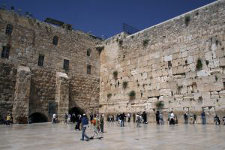
If Israel has been chosen to perform a special role in the divine plan, what promises have been given to Israel that will enable that ancient people to fulfill that role?
The Apostle Paul is clear on the great privileges that God has granted Israel. He wrote in Romans 9:4: “who are Israelites, to whom pertain the adoption, the glory, the covenants, the giving of the law, the service of God, and the promises.” Paul nowhere intimates that these great privileges have been annulled, forfeited, or cancelled. As a matter of fact the three chapters of which this verse is a part (Rom. 9-11) have as one of their purposes to emphasize that God has not cancelled His promises to Israel or transferred them to some other people! What says Paul in Romans 11:1?: “I say then, has God cast away His people? Certainly not! For I also am an Israelite, of the seed of Abraham, of the tribe of Benjamin. God has not cast away His people whom He foreknew.”
Specifically, what are those promises to Israel?
Well, they ultimately are derived from those to “Father Abraham” in Genesis 12:1-3. To sum them up, they are basically the promises of a people, a land and a blessing. The Book of Deuteronomy and the later prophets unite on the affirmation of these promises to Israel. Chapters 28 and 29 of Deuteronomy clearly delineate the dire consequences if Israel disobeys the Lord - there will be drought, exile and suffering—to name only a few of the judgments. But even if the promises of judgment are fulfilled, that does not cancel the promises of Israel’s future blessings—found in Deuteronomy 30. As we will emphasize again in this brief article, to view the promises of Israel’s judgement as having been literally fulfilled while attempting to spiritualize and then transfer the promises of her blessings to the Church involves an inconsistent hermeneutic.
As an example of many such illustrations of this principle, consider just the prophets Hosea and Micah. In Hosea 3:4 there is a promise of judgement on Israel which already has been literally fulfilled: “For the children of Israel shall abide many days without king or prince, without sacrifice or sacred pillar, without ephod or teraphim.” If that verse has had a literal fulfillment in Israel’s history of the last two thousand years, what about the next verse embodying a promise of blessing for Israel?: “Afterward the children of Israel shall return and seek the LORD their God and David their king. They shall fear the LORD and His goodness in the latter days.” If Israel was punished literally, they will be blessed literally!
Or consider the dual promises of judgement and blessing in Micah 3:12-4:2:
Therefore because of you Zion shall be plowed like a field, Jerusalem shall become heaps of ruins, And the mountain of the temple like the bare hills of the forest. Now it shall come to pass in the latter days That the mountain of the LORD’s house shall be established on the top of the mountains, and shall be exalted above the hills; And peoples shall flow to it. Many nations shall come and say, “Come, and let us go up to the mountain of the LORD, To the house of the God of Jacob; He will teach us His ways, And we shall walk in His paths.” For out of Zion the law shall go forth, And the word of the LORD from Jerusalem.
The promise of the destruction of Jerusalem and the Temple was literally fulfilled. Why would anyone then spiritualize the promise of restoration and blessing for Jerusalem and the Temple in the very next verses?
Now, someone may say that although the OT prophets may have stated that, now in the NT the Church is the so-called “New Israel” and the Church really spiritually receives those future promises of blessing to Israel. But this cannot be proved from the NT either. Already we have referred to that great chapter on Israel’s future, Romans 11. Throughout that chapter the word “Israel” refers to the Jewish people. Therefore, when Paul affirms the future blessings for Israel in Rom. 11:26-27, why would he then inject the word with a different meaning? “And so all Israel will be saved, as it is written: ‘The Deliverer will come out of Zion, And He will turn away ungodliness from Jacob; For this is My covenant with them, When I take away their sins.’” Paul actually bases his theology of blessings for a literal Israel on OT prophecies (Isa. 59:20,21 and Jer. 31:33,34).
Why should the plain and natural sense of a text be jettisoned? In Luke 1:31-33 seven promises were given to Mary. Five of them have already literally been fulfilled. Why is someone authorized to say that the remaining two will not also be literally fulfilled? Indeed, Christ shall receive the throne of His father David, and He shall rule over the house of Jacob forever, literally.
Perhaps we need to pay closer attention to the words of a layman who understood the nature of language very well, the poet and novelist Robert Louis Stevenson:
I cannot understand how you theologians and preachers can apply to the Church Scripture promises, which, in their plain meaning apply to God’s chosen people, Israel; and which consequently must be future. The prophetic books are full of teachings which, if they are interpreted literally, would be inspiring, and a magnificent assurance of a great and glorious future; but which, as they are spiritualized, become farcical…as applied to the Church they are a comedy.






Discussion